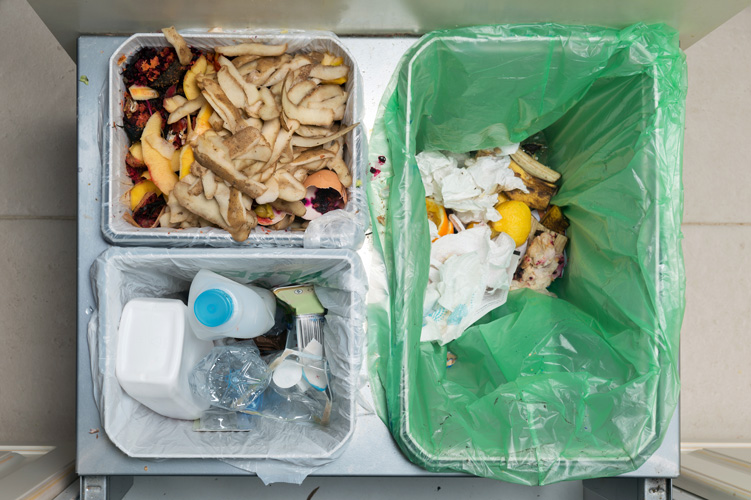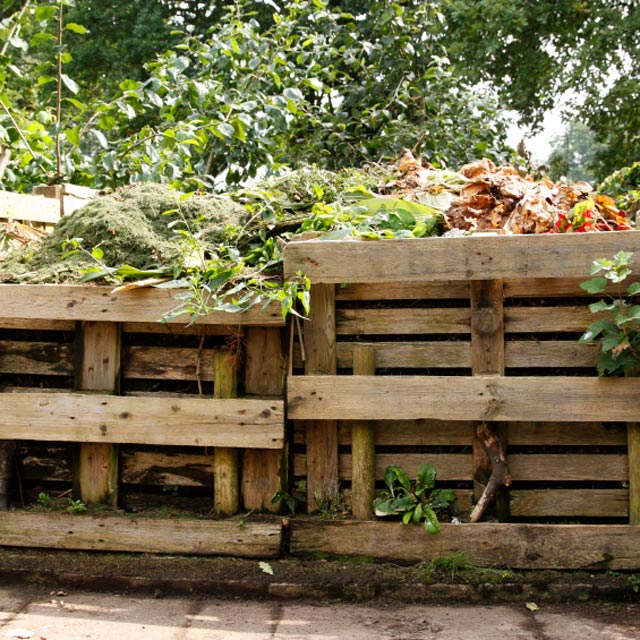
Composting is an eco-friendly practice that has gained popularity in the foodservice industry as restaurants strive to reduce their environmental impact. Restaurant composting presents a sustainable solution to the waste issue by transforming food waste into valuable compost that can be used to enrich soil, promote plant growth, and reduce the need for chemical fertilizers. By implementing a composting program, restaurants can demonstrate their commitment to sustainability, attract eco-conscious customers, and differentiate themselves in a competitive market. Below, we’ll explore the benefits of restaurant composting, discuss the key components of a successful composting program, and provide useful tips for restaurants looking to integrate composting into their operations.
Shop All Commercial Compost BinsWhat Is Composting?

Composting is the process of breaking down food scraps and other organic waste like grass clippings and certain paper and cardboard items. The process utilizes heat, moisture, agitation, air-flow, and sometimes even earthworms (a process known as vermicomposting). It's hard to imagine, but all of the organic waste that looks unappetizing when it leaves your restaurant can actually be turned into rich, dark soil through the process of composting.
Composted soil can then be used to fertilize and enrich the land for local farmers and gardeners. Depending on the regulations in your area, you could even use the compost yourself for an herb garden or landscaped patio at your establishment.
Benefits of Composting
Commercial kitchens produce a significant amount of food waste daily, making restaurant composting a valuable sustainability practice. Implementing a composting program offers numerous benefits for restaurants, the environment, and the community. By diverting organic waste from landfills, restaurants can reduce their environmental impact and contribute to a more sustainable future.
- Cost Savings - By diverting organic waste from landfills and turning it into compost, restaurants can reduce their waste disposal costs. Additionally, using compost as a soil amendment can lead to savings on fertilizers and other soil additives.
- Reduces Waste - Composting helps restaurants minimize the amount of waste they send to landfills. When utilizing organic materials such as food scraps, coffee grounds, and paper products, restaurants can significantly reduce their environmental impact and contribute to a more sustainable waste management system.
- Sustainability - Restaurant composting plays a vital role in promoting sustainability within the foodservice industry. Recycling organic waste into nutrient-rich compost closes the loop on the food cycle and reduces a restaurant's carbon footprint. This sustainable practice not only benefits the environment but also helps create more resilient and healthy soil.
- Community Engagement - By demonstrating a commitment to sustainability and environmental responsibility, restaurants can attract eco-conscious customers and build a positive reputation within the community. Engaging with customers, employees, and local organizations on composting initiatives can help raise awareness about the importance of waste reduction and inspire others to take action.
How Does Composting Work?
For composting to be successful, the process depends on four main components: materials, temperature, moisture, and air circulation.
Materials
Successful composting relies on an equal mix of both nitrogen-rich and carbon-rich materials. Nitrogen-rich materials are items like coffee grounds, grass clippings, and food scraps. Carbon-rich materials include dead leaves, newspaper, and undyed paper.
Temperature
Composting piles need to stay warm so that heat-loving microbes can properly break down the materials. The typical compost pile temperature ranges from 100-140 degrees Fahrenheit. Compost piles should be turned or mixed every three or four days so the materials can get into the warm center.
Moisture
For microbes to break down everything in the compost pile, the materials need to constantly have the moisture level of a damp sponge. There needs to be a balance in moisture levels, as not enough moisture will prevent microbes from breaking down the materials, and too much moisture will slow down the decomposition.
Air Circulation
Without air circulation, composting materials will not properly break down. A lack of oxygen can also cause compost piles to release gases that smell similar to rotten eggs. Composting bins contain ventilation holes, so oxygen can circulate amongst the materials.
What Can and Can't Be Composted?
Most food scraps and paper products can be composted in a commercial facility. The options are slightly more limited if you choose to compost on-site, but you will still dramatically reduce the amount that you send to a landfill every day. Check out the table below for a more detailed breakdown of what can and can't be composted:
Can Be Composted
- Fruit and vegetable waste
- Coffee grounds and filters
- Paper napkins
- Newspaper
- Yard clippings and wood ashes
Can't Be Composted
- Diseased Plants
- Dairy products
- Coal or charcoal ashes
- Meat and bones
- Oil, fat, and grease
How to Compost in Your Restaurant
There are many things to consider before you start composting. Follow the steps below to learn how to incorporate a composting program in your restaurant.

1. Determine if You Will Compost On-Site or Use a Haul Away Service
If you choose to compost through a haul away service, then you should contact your current waste management company and see if they offer this option, especially if you are currently locked into a contract with them. Should they not have a haul away option, you can use online resources to locate a facility near you. Once you’ve found a composting facility that is a good fit for your restaurant, talk to them about their involvement with the process. It’s important to find out if they pick up your compost waste and what they do with the waste after it’s gone through the composting process. If you choose to hire a haul away service, you'll need to have a separate bin in your restaurant for the organic waste that will eventually be composted.
Composting On Your Own
On the other hand, on-site composting gives you control of what goes into your compost pile and where the soil goes after it’s done going through the composting process. There may be health code restrictions in your area that prohibit or regulate on-site composting, so it’s important to check with your health inspector. Since space comes at a premium on a commercial property, you will also need to find a safe place for an on-site composting bin or pile that is protected from harsh weather.
What You'll Need for On-Site Composting
To successfully implement on-site composting at your restaurant, you will need a few essential items to get started. These items will help you efficiently manage your composting process and ensure that your organic waste is properly converted into nutrient-rich compost for your garden or landscaping needs.
- A Container - This container will be used to hold your materials. It can even be an old trash can, you just need to make sure that you have a fitted lid with ventilation holes.
- A Small Bag of Soil - In addition to your soil, you'll also want to add items like fallen leaves and grass clippings. If you have a landscaping service, ask them if they can collect these items as they are useful materials to have in your compost.
- A Shovel - A sturdy shovel will make it easier to maintain your compost pile and ensure that the organic matter breaks down effectively. It allows you to mix the compost materials, aerate the pile, and turn the compost for even decomposition.
Composting Steps
To effectively compost in a commercial setting, it's essential to follow specific steps that ensure the process is efficient and successful.
- Choose a Location - You’ll want to place your compost bin in an area that can be easily accessed by your employees during busy shifts. However, you should keep in mind that there’s a chance your compost could create undesirable odors if it is not turned often enough or not receiving enough oxygen.
- Add Soil - Your soil doesn’t have to fill the whole container, but you’ll want to have the bottom part of your bin filled. If you have extra soil, then feel free to add some between layers of your compost materials.
- Turn Your Compost Pile - Turn your compost pile every couple of weeks to move the materials around to the center. You’ll also want to make sure that your compost materials stay moist, like a wrung-out sponge.
- Wait for Results - It can take anywhere from a few months to a year for your compost to become usable. To know when your compost is ready, it should be pretty dark in color, almost black, and it should also have a crumbly texture with an earthy smell.
2. Educate and Train Your Staff
A composting program in your restaurant will be useless if your employees don’t understand or care about it. Taking the time to make all of your employees, from cooks to bus boys, aware of what should go in the compost and recycling bins and what should into the dumpster will help to ensure that your business reaps the benefits of composting. Some composting facilities will even come to your restaurant to help train your staff on the process. Additionally, the busyness of a commercial kitchen can be a deterrent to conscientious composting, so you’ll want to have multiple compost bins located in prime areas throughout your business. This will make it quick and easy for your employees to responsibly dispose of organic waste.
3. Make Signs in Your Back-of-House Area
Making signs and posting them around your kitchen and other employee areas will help remind your staff to keep up with the composting program. If you run an establishment where guests throw away their own food, then you’ll want to hang signs around those trash areas so that they know what should be disposed of in the composting bin. To effectively communicate the composting guidelines to your staff, consider using visuals such as pictures or icons to illustrate which items belong in the compost bin. This visual aid can help prevent contamination and ensure that only the appropriate materials are being composted.

4. Use More Eco-Friendly Materials
By using Home Certified compostable takeout containers, plates and other acceptable products and trash can liners instead of non-compostable bags and containers, you can further reduce the amount of waste your restaurant contributes to the local landfill. Using these products can also help to spread the message to your guests that you are serious about making more environmentally friendly efforts.
You should also utilize more environmentally friendly products when cleaning in your restaurant. Many conventional cleaning agents contain harmful chemicals that can disrupt the composting process and harm the environment. Look for green-certified cleaning solutions that are safe for composting.
5. Announce Your Efforts
Make an announcement to your local community about your composting program. Communicating with your community about your composting efforts can help you gain their support and possibly even their business. You could even donate your finished compost to a local park or other public area, however this is something you would need to talk about with your composting facility and local planning council.
Embracing composting as a part of your waste management strategy aligns with the growing trend of "going green" in the foodservice industry. It showcases your commitment to conservation and can be a powerful differentiator in attracting eco-conscious customers. Making the decision to implement restaurant composting is a win-win for both your business and the environment.





